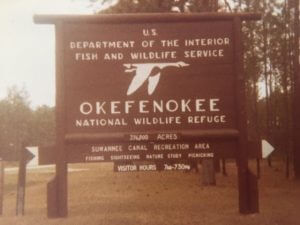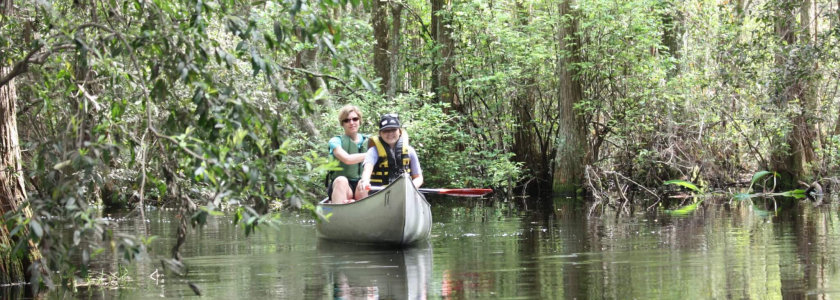Water Policy Wrap 2020 – Heartbreak and Hope

My father didn’t grow up as an outdoors person, but he started hiking and canoeing when my sister and I were young. I can remember cold backpacking trips without quite the right gear to stay warm. But, he kept us at it, and one of our favorite places to visit was the Okefenokee Swamp in southeast Georgia. With a name derived from the Choctaw word for “trembling earth,” the Okefenokee is a mysterious place – a vast freshwater wetland characterized by prairies, open water, and narrow canals. We saw bear, alligators, and birds as we paddled around bends obscured by cypress trees draped with Spanish moss on our way to a night camping site on a designated platform or island.
More recently, I’ve been able to share this magical place with my daughter (somehow, the alligators look bigger through my eyes as a parent!) and seeing it with her made me once again appreciate this stunning and significant place, laced with cobwebs and lily pads.
 Now though – this nationally renowned area, the biggest blackwater wetland in the entire country, is threatened by development of a titanium mine on its border. Because of one of the Trump Administration rollbacks to the Clean Water Act, the mining company no longer needs a federal permit to mine wetlands on the Okefenokee’s border, even though the mining operations will impact the swamp. I’m grateful for our partners including Georgia River Network and the Georgia Water Coalition who are raising alarm and advocating for state action to fill the gap.
Now though – this nationally renowned area, the biggest blackwater wetland in the entire country, is threatened by development of a titanium mine on its border. Because of one of the Trump Administration rollbacks to the Clean Water Act, the mining company no longer needs a federal permit to mine wetlands on the Okefenokee’s border, even though the mining operations will impact the swamp. I’m grateful for our partners including Georgia River Network and the Georgia Water Coalition who are raising alarm and advocating for state action to fill the gap.
Over the last four years, many of the assaults on the environment may have seemed wonky or confusing, but these changes have real impacts on people and waterways. And, not just to places where we paddle, but to our communities throughout the country that are already bearing the burden of flooding and toxic pollution. Because of these often inequitable health and environmental impacts, for this year’s policy wrap-up, we decided to highlight both what’s happened over the last year, as well as the last four, given the upcoming change in administrations.
Here are some highlights and lowlights (for a full list of environmental and energy rollbacks, see Harvard Law’s tracker):
- Weakening Clean Water Protections – with the Navigable Waters Protection Rule (also known as the “Dirty Water Rule”), the Trump Administration limited the scope of the entire Clean Water Act, stripping protections from streams and wetlands that have been protected for decades from pollution and destruction (read more about the Dirty Water Rule impacts here). Additionally, the Trump EPA limited the ability of states to set conditions on federal projects (like pipelines or hydroelectric facilities) to ensure they meet water quality standards, undermining the longstanding balance between the federal and state government in protecting clean water. Both of these rules are being litigated.
- Increasing Energy-Related Pollution – also finalized this year: a rule that allows more toxic pollution, like mercury and cadmium, into our waterways from coal fired power plants, as well as weakening protections designed to prevent more coal ash from spilling into our rivers and drinking water. Both of these rules are being litigated as well.
- Failure to Protect Clean and Safe Drinking Water for All – despite the critical need for access to drinking water, highlighted further during the COVID crisis, there was little done to protect our drinking water. Not much has been done to address PFAS at the national level (although states are moving forward), and the proposed Lead and Copper Rule fell short of fully protecting communities most at-risk from the health impacts of lead.
- Sidelining Science – in many of the above policies, the use of science was greatly diminished. For example, EPA completely ignored the advice of its own scientists and those in scientific societies when issuing the Dirty Water Rule. More fundamentally, the Administration weakened the role of science in agency advisory committees and is still working to finalize a rule that would restrict the use of important scientific studies focusing on public health.
On the brighter side:
- Increasing Funding for Public Land Protection – Congress passed the Great American Outdoors Act, providing permanent funding for the Land and Water Conservation Fund, which supports public land management (already there are concerns about implementation).
- County of Maui v. Hawai’i Wildlife Fund – the Supreme Court held that point source discharges to Waters of the US through groundwater fall under Clean Water Act regulation and require a permit.
- Funding for Water – in western Colorado, voters approved an increase in property taxes to fund projects by the Colorado River Water Conservation District to protect water supply, drinking water, and recreation.
- Stronger Protection for New Jersey Streams – in New Jersey, the state upgraded protections for 600 miles of streams, setting stricter limits on pollution and development. The upgrade means cleaner, safer recreational opportunities and safeguarding water quality from pollution.
- Water Shutoff Bans – During the pandemic, many states and local utilities stopped the practice of water shutoffs (follow these policies as tracked by the Center for Water Security and Cooperation) to ensure that people could wash their hands. Many of these policies have or are starting to expire, but in Detroit, local advocates have succeeded in extending the water shutoff moratorium, and most likely ending the practice all together!

Getting ready to paddle circa 1983.
It’s been a tough, tough year for many reasons. Thinking back to paddling the Okefenokee’s dark waters was one of many memories that sustained me through 2020. Assaults on protections for this waterway and so many of our environmental safeguards have all of us at River Network even more committed to continuing to support our network to make positive changes. As we look forward to 2021, we’ll be excited to see what is in store!






[…] we at River Network have navigated the impacts of not only this year, but the last several years, one thing has remained constant: the belief that everyone should have access to safe and […]
[…] Monday, January 11, 2021 — Democracy is fundamental to our efforts to deliver safe, clean, affordable water and healthy rivers to people and nature. We rely on our elected officials to represent the will of the people, to make decisions with the health and welfare of the public in mind, and ground their actions in what is best for our nation as a whole. This has not been the case over the last four years as the outgoing administration has prioritized polluters over people and sidelined the use of science. […]